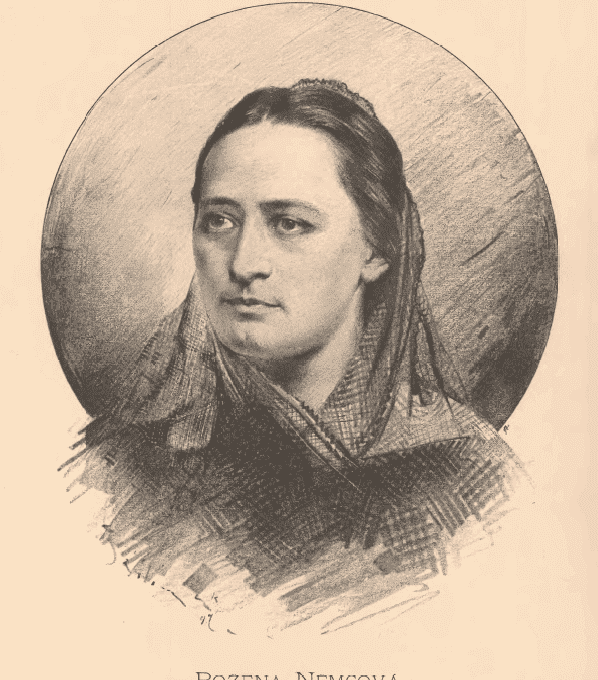Table of contents Show
Božena Němcová (1820-1862) was a notable character in Czech literature. Her famous work “Babička” (The Grandmother) is regarded as a fundamental component of the Czech literature canon. Božena Němcová, an author, folklorist, and key figure in the Czech National Revival, made significant contributions to the development of the Czech literary identity despite her relatively unknown status outside of Czech literary circles.
Apart from her creative accomplishments, Němcová was an ardent supporter of education and women’s rights. Her unrelenting advocacy for women’s access to higher education and the freedom to pursue their dreams has motivated many others to do the same.
Božena Němcová’s pioneering energy continues to inspire current Czech writers, perpetuating her legacy. Her influence may be observed in the dynamic literary landscape of the Czech Republic as well as abroad, where her work is still admired and studied by both experts and readers.
Who Was Božena Němcová?
Pioneering Czech writer Božena Němcová (1820–1862) was a significant literary personality of the 19th century. She is famous for her work “Babička” (The Grandmother), a Czech literature classic. She was born Barbora Panklová in Vienna and raised in rural Bohemia, where her grandmother and village life impacted her writing. She married Josef Němec, a government official, at an early age, but the union had political and financial challenges.
Her literary influence
Němcová’s works were influenced by Czech traditions, rural life, and societal themes. Božena Němcová
Babička (1855), her semi-autobiographical novel, honours Czech heritage, customs, and rural knowledge. She documented Czech and Slovak folk stories and novels to safeguard national traditions during a moment of nationalism. In her contemporary realist works, powerful, independent women and rural impoverished hardships were shown.
As a pioneering female writer
Němcová shattered social barriers. She promoted the Czech language during the period of the Czech National Revival and wrote about gender and social justice. Her bold, autonomous female characters and feminist advocacy made her a revolutionary 19th-century European voice.
The legacy of “Babička” by Božena Němcová
“Babička” by Božena Němcová published in 1855, is her most renowned novel and a classic in Czech literature.”Babička” is a Czech film about a young girl called Barunka who moves in with her grandmother in a small rural town. Němcová illustrates the age difference, grandmother-granddaughter bond, and the strength of familial ties through Barunka’s perspective.
Themes
Božena Němcová’s “Grandmother” explores themes of nostalgia, loss, and cultural preservation, highlighting 19th-century Czech lifestyles. Němcová’s vivid depictions of landscape, customs, and village life fully immerse readers in a traditional and folkloric world.
Impact on Czech culture
Grandmother in Czechoslovakia is a treasured classic for its representation of Czech traditions, life in the countryside, and family values. During the Czech National Revival, when language and culture were vital, it resonated. The novel’s depiction of the Czech landscape and generational wisdom make it a national treasure.
Significance
Božena Němcová’s Babička is a significant work in Czech literature that has shaped Czech culture. It is still commemorated in schools, incorporated into media, and considered essential to Czech culture. Its ageless themes and deep link to Czech heritage make it a national treasure.
Božena Němcová’s Fairy Tales and Folk Stories
Božena Němcová’s “pohádky” compilations of fairy tales and folk stories greatly influenced Czech folklore. Her works maintained and promoted Czech and Slovak oral traditions throughout national identity and culture revival. Němcová’s link to rural life and folklore shaped Czech literature through her storytelling.
By collecting and adapting Czech and Slovak folk tales, Němcová preserved generations-old oral traditions. Her notable fairy tale collections comprise “Slovenské pohádky a pověsti” (Slovak Fairy Tales and Legends). Folkloric themes including supernatural beings, moral lessons, and good triumphing over evil were in these stories.
Impact on Czech literature and culture
The preservation and promotion of Czech folklore by Božena Němcová had an enduring effect on Czech literature and culture. Her collections revived Czech traditional traditions and encouraged future writers, particularly during the Czech National Revival. She promoted Czech literature and culture by writing in Czech and highlighting folk tales.
Božena Němcová’s fairy tales and folk legends are vital for preserving Czech tradition. She helped revive 19th-century culture and establish fairy tales as a part of Czech literature and identity.
Božena Němcová’s life and works
Božena Němcová was instrumental in the Czech National Revival. Although best known for her work “Babička” (The Grandmother), her extensive literary and cultural contributions, notably fairy tales and folk traditions, remain prominent.
Personal life and struggles
Němcová grew up in rural Bohemia. Her childhood’s close bond with her grandma and rural surroundings influenced her best-known work, Babička. She wedded a government officer Josef Němec aged 17.
Financial problems and her husband’s political activities caused repeated relocation and conflicts in the marriage. Despite obstacles, Němcová remained dedicated to her writing and advocating for nationalist causes.
The life of Němcová was also coloured by personal tragedy. After losing multiple children and facing financial hardship, she developed empathy for the impoverished and marginalized, which she often wrote about. Her struggles as a woman in a society dominated by men shaped her writing, especially her attention to women’s issues and social justice.
Notable works
- “Babička” (The Grandmother, 1855)
- Fairy tales and folk stories (Pohádky)
- Short stories and essays
“Babička” by Božena Němcová: 1951 Edition and Beyond
Babicka Bozena Nemcova’s 1951 book is a treasured Czech classic. The 1951 version of Babička, released during a time of national pride and artistic revival in Czechoslovakia, highlights the novel’s strong connection to Czech identity. The edition, with its rich pictures and comments, established Babička as a symbol of Czech heritage and ideals.
Many versions of “Babička” have been made in film, theatre, and radio. In 1940 and 1971, Czech filmmakers transformed Babička into films, recreating the tale for modern audiences and bolstering its popularity. These adaptations frequently romanticize rural Bohemian life, family, and tradition.
Despite political and societal shifts, “Babička” remains relevant today. Readers still love its depiction of family, knowledge, and tradition, making it a pillar of Czech education and culture. Television and stage adaptations convey the novel’s themes of morality, love, and cultural legacy to modern audiences.
Božena Němcová: A Cultural Icon in Czechoslovakia
Božena Němcová embodied the Czech National Revival and inspired generations through her writing. Her works, including “Babička” (The Grandmother) and Czech and Slovak folklore, conserved rural customs and shaped Czech national identity during its political and cultural awakening.
Němcová represents Czech endurance, wisdom, and pride. She promoted the Czech language, culture, and social ideals in her writings, boosting national pride. The grandmother in “Babička” embodied Czech women, demonstrating tolerance, generosity, and love for family and tradition, which were crucial to Czechoslovakia’s identity.





